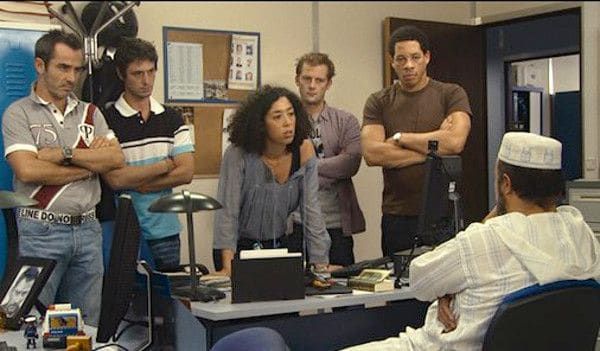Eye For Film >> Movies >> Polisse (2011) Film Review
Polisse
Reviewed by: Anne-Katrin Titze

Polisse, winner of the Jury Prize at the 2011 Cannes Film Festival and nominated for 13 César Awards successfully lures the viewer in with an emotional bait of childhood nostalgia.
Polisse is how a child might spell police. Director Maïwenn's film about the daily life of police officers in the Paris Child Protection Unit has something for everyone to identify with in the opening collage: an up-beat children's song provides the soundtrack, while we see toys, from Barbies to bathtub ducks, edited in with kids at play, on skateboards, on carousels, running around in groups, on skates, on bikes. One of the effectively planted triggers will work on you, which makes what follows even more harrowing. A group of police officers, that we will get to know quite well professionally and privately, investigates abusive parents, interrogates child molesters, looks for a kidnapped baby, and carefully talks to many different children in search of the often horrific truths of their situations.

A close up of a little girl is the first image we see. "Daddy scratches my bottom," she says. Then come the careful questions: "Under the pyjamas? Were you asleep? How do you know when you are asleep?" Next is an old man, who explains what a "hug as usual" means to him and his granddaughter.
The camera is always very close to the actors, in their faces, capturing what can only be done in fiction. Krzysztof Kieslowski once explained his switch from documentaries to fiction films this way. If this were a documentary, you would have the moral obligation to turn off the camera and do something.
Maïwenn and her co-writer Emmanuelle Bercot impressively juggle a large number of characters working in the unit, their backgrounds, private struggles and infidelities mostly being revealed over lunch talk and after-work drinks. Maïwenn, who was deeply moved by a documentary on the Child Protection Unit she saw on TV, spent a lot of time with actual police officers for her research and did not invent any of the cases.
Often the film reveals tips of gigantic icebergs: A girl pickpocket is caught in the Metro, which eventually leads to her abusive uncle, who runs a prostitution ring. A mother shakes her baby on the street and explains her other methods to stop her boys from crying after being taken to the precinct.
Raising questions of ignorance or zeal, the assaults on children in Polisse are not explained. Exactly like the police officers themselves, we don't find out what happens after the kids leave the station. The daily exposure to this violence leaves its toll. Troubled officer Fred (Joey Starr in a powerful performance) is so über-careful with his own daughter, that a simple bath becomes farcical. Nadine (Karin Viard, translucent and totally believable, as always) is going through a divorce and openly discusses her difficulties, while her friend and colleague Iris, (a fantastic Marina Foïs) tries to hide her eating disorder and despair behind toughness and a shield of offering lots of advice.
The job is difficult and the challenges manyfold. The officers raid a Romanian camp to protect the children in a big police action. Bourgeois families are not immune to child abuse. "Daddy loves me too much," a girl tells her mother. Daddy is a friend of the chief of the Child Protection Unit. Sandrine Kiberlain, who plays the mother, cries and chokes up when she explains to the police how she knows the accusations are real. "It's his style."
Reviewed on: 15 May 2012

















